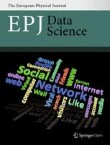2023
Call for papers: Computational Approaches for Cyber Social Threats
Edited by: Francesco Pierri, Matthew R. DeVerna, Kai-Cheng Yang, Jeremy Blackburn, Ugur Kursuncu
2022
The Past, Present, and Future of Computational Social Science
Edited by: Termeh Shafie, Christoph Stadtfeld
2021
Data Science perspectives on Economic Crime
Edited by: Johannes Wachs, Janos Kertesz, Mihaly Fazekas, Elizabeth David-Barrett
2020
Integrating Survey and Non-survey Data to Measure Behavior and Public Opinion
Edited by: Antje Kirchner, Trent Buskirk, Ingmar Weber, Nan Zhang
2018
Individual and Collective Human Mobility: Description, Modelling, Prediction
Edited by: Filippo Simini, Gourab Ghoshal, Luca Pappalardo, Michael Szell, Philipp Hövel
2016
Advances in data-driven computational social sciences
Edited by: Fosca Giannotti, Santo Fortunato, Michael Macy
2015
Making Big Data work: Smart, Sustainable, and Safe Cities
Edited by: Fabrizio Antonelli, Bruno Lepri, Alex 'Sandy' Pentland, Fabio Pianesi
2014
Scientific Networks and Success in Science
Edited by: Frank Schweitzer
Collective Behaviors and Networks
Edited by: Giovanni Luca Ciampaglia, Emilio Ferrara, Alessandro Flammini



